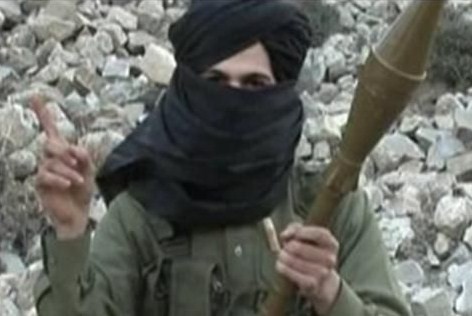
Bekkay Harrach: The Face of German Terror
Publication: Terrorism Monitor Volume: 7 Issue: 30
By:

Germany’s federal elections passed without incident on September 27, though they took place against a backdrop of intense concern in the German security services about a growing number of increasingly pointed al-Qaeda videos threatening Germany over its military deployment in Afghanistan. These messages included a videotape from Osama bin Laden on September 25, entitled “To the Peoples of Europe.” The video had English and German subtitles along with footage of German cities and monuments (Al-Fajr Media Center, September 25). The message appeared only two days before the German elections. Germany has 4,200 troops in northern Afghanistan, where they have come under more frequent attack in the last year as the Taliban insurgency spreads.
While the message from bin Laden is alarming, it appeared to only incidentally target Germany, without the terrorist leader naming it specifically. A more direct threat came from a series of videos released by Bekkay Harrach (a.k.a. Abu Talha al-Alamani), a Moroccan-born German citizen who has joined al-Qaeda in the Afghanistan-Pakistan frontier region.
Harrach specifically threatened Germany, telling Muslims to avoid places that are not “essential to daily life” in the post-election period, though he stated that the city of Kiel would remain safe (Der Spiegel, September 18). In the first video of this series, entitled “Security – A Shared Destiny,” Harrach appears clean shaven in front of a red curtain wearing a suit and blue tie – a marked contrast to previous videos in which he appeared as a veiled and turbaned fighter. Two days after this threat, a second video surfaced online, entitled “O Allah, I Love You (1),” this time showing Harrach turbaned once again. Instead of threatening Germany in this second message, Harrach extols the joys of jihad to his fellow countrymen while engaging in highly personal reflections on his relationship to Allah and jihad:
“I also want to take part in the jihad, be like a mujahid, live like a mujahid, love like a mujahid, and feel like a mujahid. However, my problem is that I am committing too many sins. Can I take part in the jihad despite all these sins, even if I do not manage to stay away from sins? Or do I have to first be free of sin?” (As-Sahab, September 20).
This was followed days later by a third German-language video, this time entitled “O Allah, I Love You (2),” which more pointedly threatened Germany once again (al-Fajr Media Center, September 24).
Bekkay Harrach’s star has ascended rapidly in jihadist circles. A figure who was once relatively unknown outside security circles, he has rapidly moved to become the face of what might be called the German jihad – a catch-all term that best describes the active phenomenon of young German Muslims who choose to go to the Afghanistan/Pakistan region to train alongside either al-Qaeda or affiliated groups like the Islamic Jihad Union (IJU) or the Islamic Movement of Uzbekistan (IMU). The depth of the problem was reinforced by the tale of a group from Bonn (including six German citizens) who left Germany with their families to join the jihad in Waziristan. They were arrested on the border and allegedly beaten by Pakistani police (Der Spiegel, September 21). Reports indicate that they remain in detention there.
Harrach was born in Morocco to a family that moved to Germany in 1981 when he was 3 or 4 years old. Once in the country, he spent most of his time in Bonn, where he was apparently active in social circles around the King Fahd Academy, an alleged local hotbed of extremism (Der Spiegel, January 27). He attended a night-school in his 20s in Bonn, where he was studying to be an engineer. He ultimately elected to attend a university at the nearby Koblenz Institute for Technology, where he studied laser technology and business mathematics (Bild, April 22, 2009). However, his studies were regularly interrupted by trips abroad to seek glory in the fields of jihad, including a trip to the West Bank in 2003. Upon his return, blood was found on his belongings and it is believed he was injured in a skirmish with Israeli troops. He is also believed to have traveled twice to post-Saddam Iraq and may even have spent time in a Syrian jail (Sueddeutsche Zeitung, September 22). While on return from one of these trips to Iraq (where he claimed he was on a “humanitarian mission”) he was stopped by Germany’s security services, who attempted to recruit him (Der Spiegel, January 27).
In 2004, he gave up on his studies and took on a role at the local Muhadshirin Mosque in Bonn where he preached in a lively and extreme fashion. Towards the end of 2006, Harrach was introduced to Aleem Nasir, a German-Pakistani “gemstone dealer” who was recently incarcerated for being an al-Qaeda facilitator. It is believed that the man who introduced them was Omer Ozdemir, a German of Turkish heritage who is currently on trial with another man on charges of belonging to al-Qaeda and helping procure funds and equipment for the group (Deutsche Presse-Agentur, September 14).
Nasir gave Harrach a formal letter providing him with an introduction to an al-Qaeda training camp before Harrach headed off to Waziristan through Iran in early 2007, leaving behind a pregnant wife. Once in Pakistan, he rapidly established himself as a bright light amongst the ranks of foreign fighters there, apparently being trained by master al-Qaeda bomb-maker Abu Ubaidah al-Masri and operating under the protection of the Haqqani network (Der Spiegel, January 27).
A clue to Harrach’s potentially important role can be found in a statement given to Der Spiegel by a Pashtun commander in the Haqqani Network, who claimed; “If we want to do something, we always ask the German for his opinion” (Der Spiegel, January 27). Harrach’s background as an engineer has apparently made him something of an expert in bomb-making.
However, it is likely Harrach’s role as a connection to the German-speaking world that has made him so important within the networks based in Pakistan. German is increasingly used in al-Qaeda or al-Qaeda-affiliate video releases – in particular those from the IMU and the IJU. The latter group was apparently behind the “Sauerland Cell” plot to attack American targets in Germany (see Terrorism Focus, January 28, 2009; November 8, 2007). Descriptions from those who knew him portrayed Harrach as a personable chap, recalled by acquaintances who knew him in Bonn as not bearing the outward appearance of an extremist yet capable of persuading his wife, a German convert to Islam, to leave the comfort of Bonn to join him with their young child in the less accommodating badlands of Waziristan (Sueddeutsche Zeitung, September 22; Spiegel, January 27).
Whatever his actual role in al-Qaeda, his messages to his adopted land have put German authorities on the highest alert. Armed police patrol major airports and rail stations and security forces detained two men “of Arabic origin” in Munich after a judge approved their preventive detention until the Bavarian city’s Oktoberfest beer festival is over. Increased security at the event led one German news source to say “Oktoberfest has been transformed from a beer festival into a beer fortress” (Spiegel, September 29). One of the men detained was in contact with Harrach, while the other apparently knew him through a relative (Spiegel, September 28). Police previously arrested a young Turkish man in Stuttgart for allegedly posting one of Harrach’s videos online (Hurriyet, September 25).
It is the specificity of the threat that has alarmed watchers. While earlier official alerts have been sent out to German companies operating abroad (especially in North Africa), the focus on Germany and the specific timeline hinted in this new set of videos has officials particularly alarmed. The numbers being leaked to the press are equally disturbing – German officials say they are concerned about some 180 individuals who “have received or intend to receive paramilitary training.” About 80 of these individuals have returned to Germany but only 15 are in custody (Spiegel, September 28). Whether Harrach is able to draw from this pool to live up to his threat of giving Germany a “rude awakening” seems unclear, but it is certain that he was able to force the issue of Germany’s military role in Afghanistan onto the political agenda.





